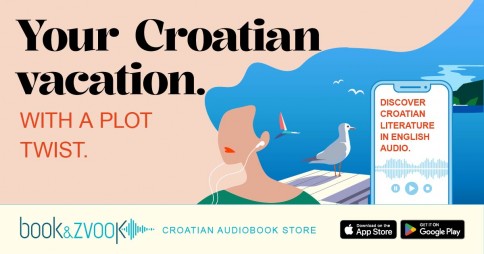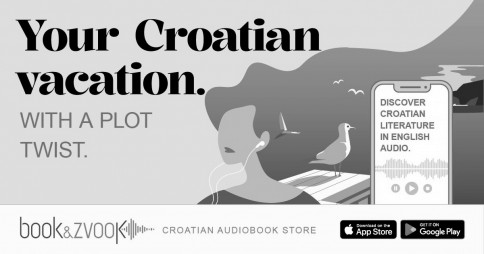news
What to Listen to When Travelling to Croatia
When travelling, we often rely on playlists or podcasts to fill the silence between destinations. But what if your headphones could offer something more immersive, not just background noise, but a way into the soul of the place you’re in?
With the growing library of Croatian audiobooks in English and a selection of pure field recordings from the country's most striking natural settings, book&zvook, Croatia’s first digital audiobook platform, invites travellers to experience the country through its voices, its literature, and its soundscapes.
Whether you're strolling through stone alleys, stuck in ferry queues, or watching the horizon from a car window, here’s what to listen to while Croatia unfolds around you.
What to Listen to When Travelling to Croatia Voices, landscapes, and stories you can take with you. written by: book&zvook When travelling, we often rely on playlists or podcasts to fill the silence between destinations. But what if your headphones could offer something more immersive, not just background noise, but a way into the soul of the place you’re in? With the growing library of Croatian audiobooks in English and a selection of pure field recordings from the country's most striking natural settings, book&zvook, Croatia’s first digital audiobook platform, invites travellers to experience the country through its voices, its literature, and its soundscapes. Whether you're strolling through stone alleys, stuck in ferry queues, or watching the horizon from a car window, here’s what to listen to while Croatia unfolds around you. Stories that Travel Well: Croatian Audiobooks in English You don’t need a guidebook to understand where you are. Sometimes, fiction does it better. A Cat at the End of the World by Robert Perišić There’s a rare kind of narrative that speaks in multiple directions at once, to myth and to memory, to contemporary political unease and to pre-philosophical instinct. Robert Perišić’s novel does exactly that, staging an escape from the order of a collapsing empire through the eyes of a slave boy, a misbehaving Egyptian cat, and a philosophical donkey. A fourth voice, that of the Scatterwind, or perhaps time itself, overlays the story with a commentary that is at once intimate and panoramic. Mediterranean: A Cultural Landscape by Predrag Matvejević Matvejević’s Mediterranean is neither a place nor a border but a palimpsest of histories, tongues, ruins, and recipes. Originally written in the late 1980s but timeless in scope, this is not a travel guide but a meditation, learned, lyrical, and restlessly associative. He moves across coasts and centuries like a monk gathering fragments: obscure maps, lost customs, port gossip, peasant proverbs, and Byzantine echoes. Karakaš writes with the economy of someone who distrusts excess. Celebration is a compact novel with the density of a confession and the chill of a parable. Set deep in the woods, in a raw and remote rural region shaped by violence, superstition, and dread, the story follows a young man returning to his village in the wake of war, carrying silence like a wound. Karakaš never raises his voice, and that restraint is his sharpest tool. The narration is stark, the emotional charge relentless. Beneath the minimalism lies a deep excavation of masculinity, trauma, and the dark poetry of survival. A haunting listen. Underground Barbie by Maša Kolanović This collection of stories is both a sly diagnosis and a covert protest. Kolanović writes from within a society addicted to late-capitalist spectacle and post-transition paradox, yet her voice is never cynical. The stories oscillate between the hyperreal and the melancholically absurd: shopping mall flâneurs, wounded girlhoods, ghostly consumer objects. Farewell, Cowboy by Olja Savičević Ivančević A punk western in sandals. This novel sets its plot in a sun-bleached, half-abandoned coastal town and wraps grief in sarcasm, gender critique in narrative tightropes, and regional specificity in universal ache. The narrator, a fierce woman in search of the truth behind her brother’s death, cuts through the dust of the past with a blade that’s both sharp and glittering. Call Me Esteban by Lejla Kalamujić Fragmentary, intimate, and luminous with emotional precision, Kalamujić’s autofictional narrative orbits themes of grief, queerness, illness, and the body’s fragility. Yet nothing here is heavy-handed. The language is lean, the structure elliptical, and the effect cumulative. A multi-generational family saga set in Osijek, "Unterstadt" reveals the sedimented traumas of 20th-century Central Europe through a woman's voice both haunted and defiant. The novel refuses to be brief, and rightly so: it deals in what is repressed, buried, denied. Water, Spiderweb by Nada Gašić Gašić writes like someone who has watched silence grow limbs. In this quiet but fierce novel, the lives of several women converge around a family house and a set of absences too dense to name. Memory is not linear here, nor is love, nor time. A Journey to Russia by Miroslav Krleža This is not a journey, but an excavation. Written in the 1920s by one of Yugoslavia’s sharpest literary minds, Krleža’s account of Soviet Russia is both critique and performance. His prose crackles with suspicion, fascination, and that peculiar arrogance reserved for writers who sense they are smarter than history itself. It is also, uncannily, a book about now: about systems, mythologies, and what we choose to ignore. Hearing Krleža read aloud today feels like listening to a letter sent to the future, which somehow arrived. Sarajevo Marlboro by Miljenko Jergović Every city has its ghosts, but Sarajevo has a choir. Jergović’s landmark collection of wartime stories gives voice to the ordinary lives fractured by siege, not with sentiment, but with luminous specificity. The tone is patient, the images quietly annihilating. Soundscapes: Listening Without Words In a country so often reduced to visuals - sea, stone and sun - these field recordings offer something radical: the act of hearing place without narration. In "From Drop to Waterfall," the acoustic arc of Plitvice Lakes is rendered from trickle to roar. "Symphony of the Adriatic" dives into maritime frequencies: waves, wind, underwater hush. "The Last Oasis" captures Kopački rit at dawn, teeming and still. Together, they form a triptych of Croatian presence before language. For moments when you don’t want to be guided, just enveloped. 📲 How to Listen All titles are available on the book&zvook mobile app (iOS & Android). To listen: Croatia is full of visual marvels, but there’s a richness in its literature and sounds that photos can’t capture. This summer, don’t just see the country. Hear it. …
This is no allegory in the strict sense, and no costume drama either. It is a novel written with the rhythm of fable and the ethical tension of late realism. In its gentle undoing of human primacy, Perišić offers not a critique, but a quiet realignment: what if freedom begins not with rebellion, but with noticing what and who the world has left out?
Listening to Matvejević is like overhearing the sea think. This is cultural geography as literature, and literature as moral cartography. Ideal for readers who travel to deepen rather than escape, and who prefer salt to sugar in their intellectual diet.
Her language shimmers with irony and pain, even when it smiles. "Underground Barbie" reads like the subconscious of a country that knows exactly what has been sold, and who paid for it. Short enough for transit listening, rich enough to replay.
Savičević Ivančević writes with a voice that is unapologetically local, yet disarmingly translatable. If you like your fiction sunburned, seductive, and smarter than it pretends to be, this is your Croatian summer noir.
This is not a linear memoir but a constellation of losses and survivals. Listening to it feels like stepping into someone’s carefully curated silence. The result is as political as it is personal: a refusal to simplify what identity feels like from the inside.
Its structure is symphonic, its historical grasp precise, its emotional reach devastating. In audiobook form, the text gains a kind of choral intensity. Listening becomes an act of both witnessing and reckoning. Not light summer fare, but essential.
There’s a kind of feminist mysticism at work, though never declared. Listening to this novel feels like entering a room you used to know, only to find that the light now falls differently. Recommended for listeners who appreciate emotional slow burns.
These are short stories that don’t announce themselves. They settle in slowly and leave sediment. A rare case where listening deepens the wound, and somehow, also the care.
Final Note: Travel Light, Listen Deep
panorama
Rebecca Duran's Take on Modern Day Life in Pazin (Istria)
Croatia is a small, charming country known today as a prime European tourist destination. However, it has a complicated often turbulent history and is seemingly always destined to be at the crossroads of empires, religions and worldviews, with its current identity and culture incorporating elements from its former Communist, Slavic, Austrian-Hungarian, Catholic, Mediterranean, and European traditions.
review
Review of Dubravka Ugrešić's Age of Skin
Dubravka Ugrešić is one of the most internationally recognizable writers from Croatia, but she has a contentious relationship with her home country, having gone into self-exile in the early 90s. Her recently translated collection of essays, The Age of Skin, touches on topics of of exile and displacement, among others. Read a review of Ugrešić’s latest work of non-fiction, expertly translated by Ellen Elias-Bursac, in the link below .
review
Review of Neva Lukić's Endless Endings
Read a review of Neva Lukić's collection of short stories, Endless Endings, recently translated into English, in World Literature Today.
panorama
A Guide to Zagreb's Street Art
Zagreb has its fair share of graffiti, often startling passersby when it pops up on say a crumbling fortress wall in the historical center of the city. Along with some well-known street murals are the legendary street artists themselves. Check out the article below for a definitive guide to Zagreb's best street art.
panorama
Beloved Croatian Children's Show Professor Balthazar Now Available in English on YouTube
The colorful, eclectic and much beloved Croatian children's cartoon Professor Balthazar was created by Zlatko Grgić and produced from the late 1960s through the 1970s. Now newer generations will be able to enjoy the Professor's magic, whether they speak Croatian or English.
panorama
An English Book on Croatian Football Legend Robert Prosinečki
Robert Prosinečki's long and fabled football career includes winning third place in the 1998 World Cup as part of the Croatian national team, stints in Real Madrid and FC Barcelona as well as managerial roles for the Croatian national team, Red Star Belgrade, the Azerbaijani national team and the Bosnian Hercegovinian national team.
panorama
Jonathan Bousfield on the Seedy Side of the Seaside
From strange tales of mysterious murders to suspected criminals hiding out to scams, duels and gambling, Opatija, a favourite seaside escape for Central Europeans at the turn of the last century, routinely filled Austrian headlines and the public's imagination in the early 20th century.
review
Review of new English translation of Grigor Vitez's AntonTon
Hailed as the father of 20th century Croatian children's literature, Grigor Vitez (1911-1966) is well known and loved in his homeland. With a new English translation of one of his classic tales AntonTon (AntunTun in Croatian), children around the world can now experience the author's delightful depiction of the strong-minded and silly AntonTon. The Grigor Vitez Award is an annual prize given to the best Croatian children's book of the year.
news
The Best of New Eastern European Literature
Have an overabundance of free time, thanks to the pandemic and lockdowns? Yearning to travel but unable to do so safely? Discover the rhythm of life and thought in multiple Eastern European countries through exciting new literature translated into English. From war-torn Ukraine to tales from Gulag inmates to the search for identity by Eastern Europeans driven away from their home countries because of the economic or political situations but still drawn back to their cultural hearths, this list offers many new worlds to explore.
panorama
More Zagreb Street Art
Explore TimeOut's gallery of fascinating and at times thought-provoking art in the great open air gallery of the streets of Zagreb.
panorama
Welcome to Zagreb's Hangover Museum
Partied too hard last night? Drop by Zagreb's Hangover Museum to feel more normal. People share their craziest hangover stories and visitors can even try on beer goggles to experience how the world looks like through drunken eyes.
panorama
Jonathan Bousfield on the Future as Imagined in 1960s Socialist Yugoslavia
How will the futuristic world of 2060 look? How far will technology have advanced, and how will those advancements affect how we live our everyday lives? These are the questions the Zagreb-based magazine Globus asked in a series of articles in 1960, when conceptualizing what advancements society would make 40 years in the future, the then far-off year of 2000. The articles used fantastical predictions about the future to highlight the technological advancements already made by the then socialist Yugoslavia. Take a trip with guide, Jonathan Bousfield, back to the future as envisioned by journalists in 1960s Yugoslavia.
panorama
Untranslatable Croatian Phrases
What’s the best way for an open-minded foreigner to get straight to the heart of another culture and get a feel for what makes people tick? Don’t just sample the local food and drink and see the major sights, perk up your ears and listen. There’s nothing that gives away the local flavor of a culture more than the common phrases people use, especially ones that have no direct translation.
Check out a quirky list of untranslatable Croatian phrases from Croatian cultural guide extraordinaire, Andrea Pisac, in the link below:
panorama
Jonathon Bousfield on the Museum of Broken Relationships
Just got out of a serious relationship and don't know what to do with all those keepsakes and mementos of your former loved one? The very popular and probably most unique museum in Zagreb, the Museum of Broken Relationships, dedicated to preserving keepsakes alongside the diverse stories of relationships gone wrong, will gladly take them. Find out how the museum got started and take an in-depth look at some of its quirkiest pieces in the link below.
panorama
Cool Things To Do in Zagreb
Zagreb is Croatia’s relaxed, charming and pedestrian-friendly capital. Check out Time Out’s definitive Zagreb guide for a diverse set of options of what to explore in the city from unusual museums to legendary flea markets and everything in between.
panorama
Jonathan Bousfield on Diocletian's Legacy in Split
Diocletian’s Palace is the main attraction in Split, the heart and soul of the city. Because of the palace, Split’s city center can be described as a living museum and it draws in the thousands of tourists that visit the city annually. But how much do we really know about the palace’s namesake who built it, the last ruler of a receding empire? Jonathan Bousfield contends that history only gives us a partial answer.
interview
The Poetry of Zagreb
Cities have served as sources of inspiration, frustration, and discovery for millennia. The subject of sonnets, stories, plays, the power centers of entire cultures, hotbeds of innovation, and the cause of wars, cities are mainstays of the present and the future with millions more people flocking to them every year.
Let the poet, Zagreb native Tomica Bajsić, take you on a lyrical tour of the city. Walk the streets conjured by his graceful words and take in the gentle beauty of the Zagreb of his childhood memories and present day observation.
panorama
You Haven't Experienced Zagreb if You Haven't Been to the Dolac Market
Dolac, the main city market, is a Zagreb institution. Selling all the fresh ingredients you need to whip up a fabulous dinner, from fruits and vegetables to fish, meat and homemade cheese and sausages, the sellers come from all over Croatia. Positioned right above the main square, the colorful market is a beacon of a simpler way of life and is just as bustling as it was a century ago.
panorama
Croatian Phrases Translated into English
Do you find phrases and sayings give personality and flair to a language? Have you ever pondered how the culture and history of a place shape the common phrases? Check out some common sayings in Croatian with their literal translations and actual meanings below.
panorama
Discover Croatia's Archaeological Secrets
Discover Croatia’s rich archaeological secrets, from the well known ancient Roman city of Salona near Split or the Neanderthal museum in Krapina to the often overlooked Andautonia Archaeological Park, just outside of Zagreb, which boasts the excavated ruins of a Roman town or the oldest continuously inhabited town in Europe, Vinkovci.
panorama
Croatian Sites on UNESCO World Heritage Tentative List
A little know fact is that Croatia, together with Spain, have the most cultural and historical heritage under the protection of UNESCO, and Croatia has the highest number of UNESCO intangible goods of any European country.
panorama
Croatian National Theatre in Zagreb
The National Theater in Zagreb, Croatia’s capital, is one of those things which always finds its way to every visitor’s busy schedule.
panorama
Zagreb's Street Art
So you're visiting Zagreb and are curious about it's underground art scene? Check out this guide to Zagreb's street art and explore all the best graffiti artists' work for yourself on your next walk through the city.
panorama
Zagreb Festivals and Cultural Events
Numerous festivals, shows and exhibitions are held annually in Zagreb. Search our what's on guide to arts & entertainment.












































.jpg)
.jpg)




